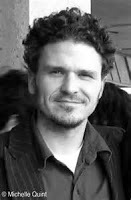Book Review: The Circle
Mae gets a job at the Circle, a mega-technological firm that has its hands in everything from the internet to social media and is gobbling up starts-up like so much plankton. The Circle rewards its employees with fantastic health care, access to new gadgets, and endless scores of products to test and review. Its business goal is to make its products ubiquitous in every aspect of daily life. A sort of benevolent dictatorship of all things technological.
 At first Mae is overwhelmed by the business campus, with its vast lunchrooms, fitness centers, swimming pools, and even studio apartments for employees too busy to go home. She also discovers that the work pace requires the dexterity of an octopus as more and more computer screens are placed on her desk. Social media is as much a part of the work environment as responding to customer queries. Not only does Mae have to keep up a 98% approval rating in her work, she also has to participate in commenting on and responding to postings and reviews by her co-workers. And her co-workers are an enthusiastic lot with hypersensitive egos, quick to be hurt if they think Mae is slighting them by not interacting with their running commentaries. After a rough learning curve, Mae starts getting the hang of the Circle’s expectations, and soon she is participating in everything.
At first Mae is overwhelmed by the business campus, with its vast lunchrooms, fitness centers, swimming pools, and even studio apartments for employees too busy to go home. She also discovers that the work pace requires the dexterity of an octopus as more and more computer screens are placed on her desk. Social media is as much a part of the work environment as responding to customer queries. Not only does Mae have to keep up a 98% approval rating in her work, she also has to participate in commenting on and responding to postings and reviews by her co-workers. And her co-workers are an enthusiastic lot with hypersensitive egos, quick to be hurt if they think Mae is slighting them by not interacting with their running commentaries. After a rough learning curve, Mae starts getting the hang of the Circle’s expectations, and soon she is participating in everything.
Dave Eggars’ novel The Circle tackles the subsuming of human interaction into shallow connections through the internet. There is no such thing as close friends or deep dialogue; every form of communication is reduced to emoji and sharing. And at the rate the Circle is tapping into every aspect of a person’s life, people’s identities are nothing more than their TruSelf, their on-line avatar.
 Be true to your
Be true to your
TruSelfEggars is unnervingly perceptive in his social critique, carrying ideas to their inevitable conclusions. The Circle is probably the most accurately predictive dystopian novel out there. By blending together Google, FaceBook, Twitter, and other forms of social media, he creates a chillingly recognizable world.
But here’s my problem with the book: do I praise Eggars’ concept or do I address how tedious the writing can be?
I don’t skim books, but I confess that once or twice I was speed-reading through some redundant scenes. A character discusses how some technology will change the world, and it gets launched, then another character describes another tech gadget and how it will be the next big thing. I realize Eggars is building a world based closely on our own, so he takes his time to make everything seem plausible and familiar. But after a while I kept thinking, “Okay, I get it. Let’s move on.”
As a main character, Mae is not terribly interesting. She has no personality and isn’t particularly likable. So, is this Eggars’ critique that people don’t feel they exist as individuals until they connect through social media? Or would it have worked better if Mae had been her own person at the beginning of the novel and eventually got devoured by the Circle?
The novel takes a compelling turn once Mae chooses to go transparent. This is one of the primary topics of the story: the assumption that if everything is known and nothing hidden, then humans will learn to behave better. If we are always under surveillance, we will not commit crimes. If we are always performing before an audience, we will be our best selves.
Mae starts wearing a camera that broadcasts her life 24/7 and soon discovers how addictive it is to have millions of followers commenting and praising her choices in life. However, the pressure to please all of them creates a psychic fissure until her neediness for their approval starts determining all her actions. She is no longer an individual but an avatar for her legion of fans.
Eggars’ ideas are compelling and will definitely stay with me. They have even made me reconsider how I interact over social media. But the biggest drawback to The Circle is the quality of the writing. I am definitely a fan of Eggars, but I expected something more from his pacing and storytelling.
 At first Mae is overwhelmed by the business campus, with its vast lunchrooms, fitness centers, swimming pools, and even studio apartments for employees too busy to go home. She also discovers that the work pace requires the dexterity of an octopus as more and more computer screens are placed on her desk. Social media is as much a part of the work environment as responding to customer queries. Not only does Mae have to keep up a 98% approval rating in her work, she also has to participate in commenting on and responding to postings and reviews by her co-workers. And her co-workers are an enthusiastic lot with hypersensitive egos, quick to be hurt if they think Mae is slighting them by not interacting with their running commentaries. After a rough learning curve, Mae starts getting the hang of the Circle’s expectations, and soon she is participating in everything.
At first Mae is overwhelmed by the business campus, with its vast lunchrooms, fitness centers, swimming pools, and even studio apartments for employees too busy to go home. She also discovers that the work pace requires the dexterity of an octopus as more and more computer screens are placed on her desk. Social media is as much a part of the work environment as responding to customer queries. Not only does Mae have to keep up a 98% approval rating in her work, she also has to participate in commenting on and responding to postings and reviews by her co-workers. And her co-workers are an enthusiastic lot with hypersensitive egos, quick to be hurt if they think Mae is slighting them by not interacting with their running commentaries. After a rough learning curve, Mae starts getting the hang of the Circle’s expectations, and soon she is participating in everything.Dave Eggars’ novel The Circle tackles the subsuming of human interaction into shallow connections through the internet. There is no such thing as close friends or deep dialogue; every form of communication is reduced to emoji and sharing. And at the rate the Circle is tapping into every aspect of a person’s life, people’s identities are nothing more than their TruSelf, their on-line avatar.
 Be true to your
Be true to yourTruSelfEggars is unnervingly perceptive in his social critique, carrying ideas to their inevitable conclusions. The Circle is probably the most accurately predictive dystopian novel out there. By blending together Google, FaceBook, Twitter, and other forms of social media, he creates a chillingly recognizable world.
But here’s my problem with the book: do I praise Eggars’ concept or do I address how tedious the writing can be?
I don’t skim books, but I confess that once or twice I was speed-reading through some redundant scenes. A character discusses how some technology will change the world, and it gets launched, then another character describes another tech gadget and how it will be the next big thing. I realize Eggars is building a world based closely on our own, so he takes his time to make everything seem plausible and familiar. But after a while I kept thinking, “Okay, I get it. Let’s move on.”
As a main character, Mae is not terribly interesting. She has no personality and isn’t particularly likable. So, is this Eggars’ critique that people don’t feel they exist as individuals until they connect through social media? Or would it have worked better if Mae had been her own person at the beginning of the novel and eventually got devoured by the Circle?
The novel takes a compelling turn once Mae chooses to go transparent. This is one of the primary topics of the story: the assumption that if everything is known and nothing hidden, then humans will learn to behave better. If we are always under surveillance, we will not commit crimes. If we are always performing before an audience, we will be our best selves.
Mae starts wearing a camera that broadcasts her life 24/7 and soon discovers how addictive it is to have millions of followers commenting and praising her choices in life. However, the pressure to please all of them creates a psychic fissure until her neediness for their approval starts determining all her actions. She is no longer an individual but an avatar for her legion of fans.
Eggars’ ideas are compelling and will definitely stay with me. They have even made me reconsider how I interact over social media. But the biggest drawback to The Circle is the quality of the writing. I am definitely a fan of Eggars, but I expected something more from his pacing and storytelling.
Published on January 18, 2016 06:40
No comments have been added yet.



